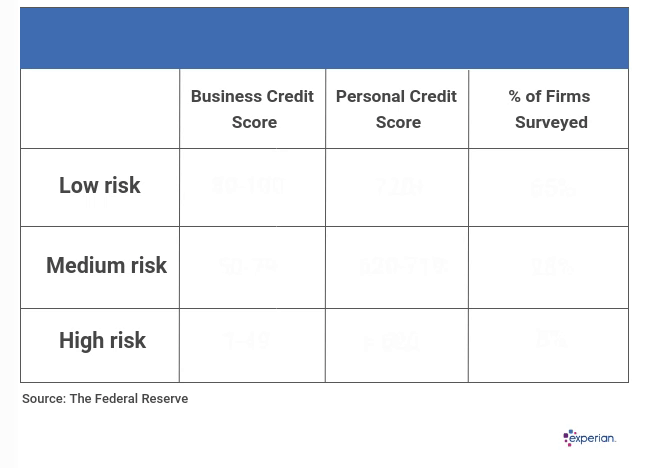
Maintaining a good business credit score should be a priority for all businesses. It helps with securing credit cards, loans and leases, and can aid negotiations for favorable terms with vendors. It can also prevent business owners from having to put their personal assets or creditworthiness on the line by separating their business’s credit from their personal credit reports and scores.
What constitutes a good business credit score? Each of the three major business credit reporting agencies uses its own scoring model. Moreover, every vendor and lender is likely to have its own criteria, so there’s really no universal standard for what’s good or bad. There are, however, some guidelines you can use for a general reference.
What Is a Good Business Credit Score?
To help get some context for your business credit score, you can start by looking at how business credit scoring ranges might correspond to levels of risk. The Federal Reserve’s 2022 Small Business Credit Survey provided a handy definition of risk levels using both personal and business credit scores:
While fitting into one of these risk levels doesn’t necessarily translate into absolute success or failure in accessing funds, it can certainly help your odds. In the Fed survey, 62% of low-risk applicants for small-business funding received all of the money they requested, compared with 39% of medium-risk applicants and just 23% of high-risk borrowers.
Experian’s Intelliscore PlusSM uses the following ranges to describe risk:

How Do Business Credit Scores Work?
Business credit scores are similar to personal credit scores in several regards. In both cases, financial institutions and other account owners report your account and payment information to credit reporting agencies. Agencies use this data to create credit reports, which in turn are used to calculate credit scores. A business’s credit score is an indicator of the level of risk it represents when it comes to missing payments or defaulting on debt.
Where most modern general-use personal credit scores range from 300 to 850, business credit score ranges can vary. Experian business credit scores range from 1 to 100. An Experian business credit report typically contains identifying information; payment history; public records of judgments, liens or bankruptcies; inquiries; company background; and your business credit score. You can view a sample Experian business credit report to get a sense of how this information appears.
As with personal credit scores, the precise formulas used to calculate your business credit score are proprietary. But the factors that contribute to the calculation are known:
- Number of trade experiences
- Outstanding balances
- Payment habits
- Credit utilization
- Trends over time
- Public record recency, frequency, and dollar amount
- Demographics such as years on file, SIC codes, and business size
Where Can I Check My Business Credit Score?
The best way to understand your business credit reports and scores is to see them for yourself. Here’s where to go to access your score and report:
● Experian: Visit Experian’s website to access your Experian business credit report or sign up for Business Credit Advantage credit monitoring.
Credit monitoring can also help you stay on top of your business’s credit. Experian’s Business Credit Advantage provides access to your current business credit file, sends alerts when any changes occur, and even offers tips for improving your company’s credit standing.
How to Improve Your Business Credit Score
Improving your business credit score generally involves two steps: establishing credit and building on your existing success. Here are a few tips to get you started:
- Establish your business as a corporation or LLC, so you have a dedicated business identity. If you’re a sole proprietor, apply for an employer identification number (EIN).
- Work with vendors that report to at least one of the three main business credit reporting agencies. Encourage vendors that don’t to do so.
- Open credit using your business identity only, even if you have other accounts that rely on your personal credit as a guarantee and even if you have to start small. Utilize your business credit and pay it off on time.
- Don’t overutilize business credit. At the same time, don’t overdo spending on any account. In the same way that maxing out your personal credit lines can negatively impact your credit score, carrying a balance that’s close to the limit on your business credit can be a drag. Keep credit utilization below 30%, and the lower, the better.
- Pay on time, every time. Pay early if you can.
- Separate your business and personal credit. Although securing credit for your business without a personal guarantee can be difficult, avoid personal guarantees on your business lines once you’ve established a strong payment history.
- Download our free Blueprint for Establishing and Building Business Credit. It contains step-by-step instructions and tips.
Finding Room for Improvement
Focusing on business credit is a worthwhile practice: Good credit is the key that unlocks funding for growth, resources in an emergency, low-interest rates and great supplier terms to promote efficiency and a host of other building blocks for financial resilience.
Check up on your business credit and, if warranted, look for ways to improve your business credit score. To paraphrase an old cliché, you can never be too rich or too creditworthy in business.
About the author

Gayle Sato
Gayle Sato writes about financial services and personal financial wellness, with a special focus on how digital transformation is changing our relationship with money. As a business and health writer for more than two decades, she has covered the shift from traditional money management to a world of instant, invisible payments and on-the-fly mobile security apps. Gayle began her career as a staff writer for Entrepreneur magazine. As an independent publisher, she edited and produced a series of personal finance magazines for credit union members and THINK, an executive magazine for the credit union industry.
